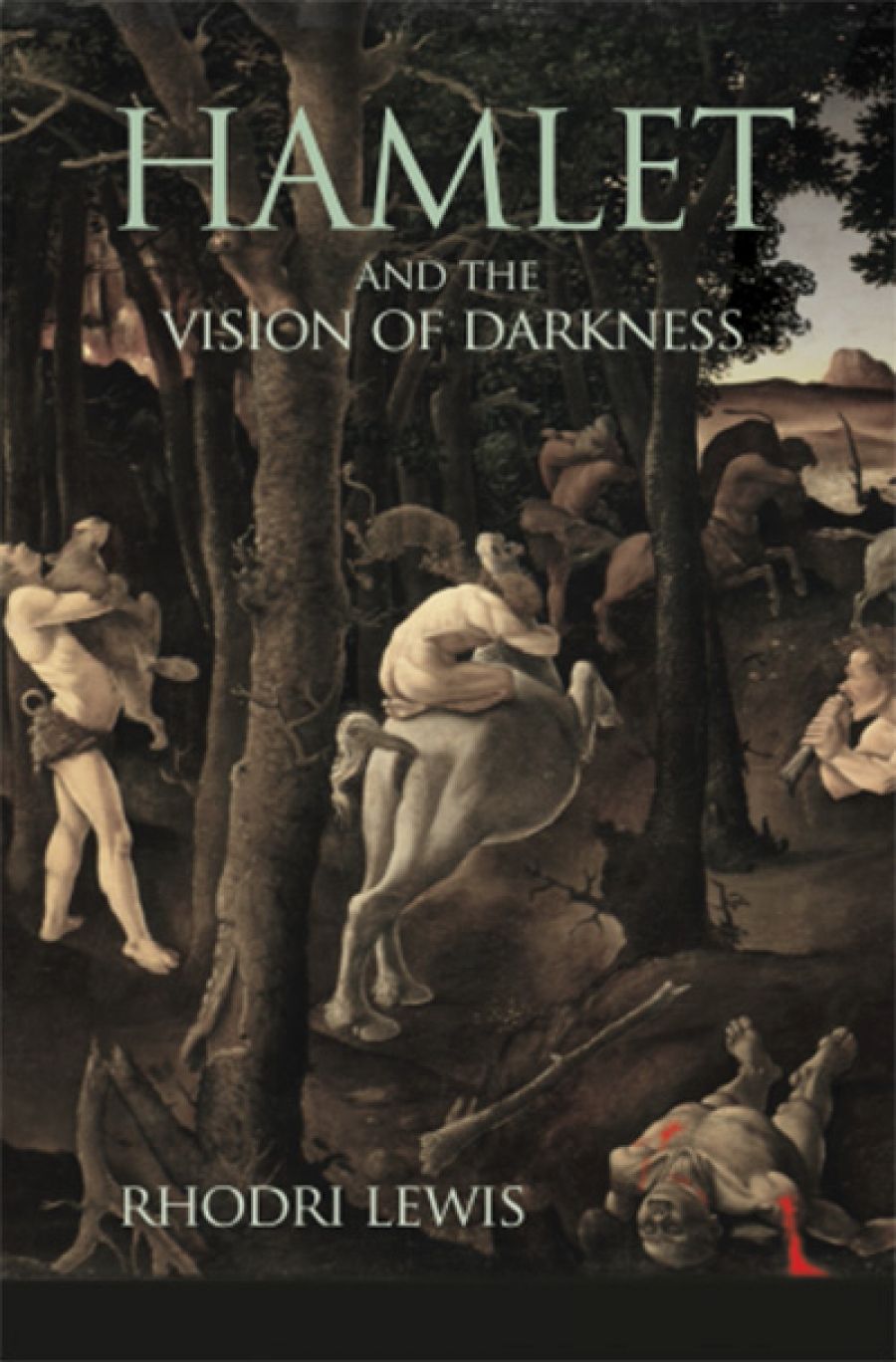
- Free Article: No
- Contents Category: Shakespeare
- Custom Article Title: David McInnis reviews 'Hamlet and the Vision of Darkness' by Rhodri Lewis
- Review Article: Yes
- Online Only: No
- Custom Highlight Text:
There have been more than 600 publications on Hamlet in the last five years alone. Uniquely amongst Shakespeare’s plays, Hamlet even has an entire journal devoted to it: Hamlet Studies. Offering something new in these circumstances takes courage. Drawing inspiration from Margreta de Grazia’s liberation of Hamlet from ...
- Book 1 Title: Hamlet and the Vision of Darkness
- Book 1 Biblio: Princeton University Press (Footprint), $77 hb, 392 pp, 9780691166841
Lewis’s interrogation of the Ciceronian-humanist context of Shakespeare’s play is fresh and compelling. Despite being an eminently sensible context for reading ‘the relationship between selfhood and performance’ as critiqued throughout the sixteenth century, the moral philosophy and ‘discursive legacy’ of the humanist writer Cicero has surprisingly not featured substantially in studies of Hamlet. Surveying the Ciceronian tradition, Lewis proposes that ‘Hamlet offers a portrait of refractory moral dislocation that, as it was intended to, leaves these doctrines in ruins’. Far from gaining self-knowledge through the instruction of the humanists, ‘humankind is bound in ignorance of itself’ in Hamlet, and Hamlet is ‘the finely drawn embodiment of a moral order that is collapsing under the weight of its own contradictions’.
The first two chapters establish and repudiate (respectively) the Ciceronian context of Hamlet, the vehicle for repudiation being a fascinating study of hunting vocabulary. Shakespeare’s familiarity with hunting terminology is well documented, but Hamlet specifically has not been analysed through this lens until now. The technical terms of hunting, falconry, fishing, and other related pursuits are shown to underscore the rhetoric of the entire play, often hiding in plain sight, as for example with such terms as ‘havoc’, ‘unkennel’, ‘coting’ (overtaking prey and forcing it to change direction), ‘coupling’ (joining hounds together prior to ‘uncoupling’ them upon identification of the prey), and even ‘false fire’ (blank shots). Frequently, they carry subtle but important meanings: to ‘catch’ the conscience of the king is wildly inappropriate, for as Lewis notes, one ‘catches’ rabbits and fish, but not (unless illicitly) harts or hares. Shakespeare, in Hamlet, sees hunting as ‘animalistic guile masquerading as virtue’, but instead of condemning it, uses it as ‘a metaphor through which to comprehend the way things are, however disagreeable these might seem to be’.
The characters regard themselves as politic huntsmen, but the play’s hunting vocabulary ‘collapses the distinctions that its dramatis personae would establish between themselves’ such that hunter and prey prove interchangeable and the hunting activities ‘become the analogues of dishonour, dishonesty, and moral debasement’. Claudius possesses sufficient self-awareness to apprehend the problem of ‘sham’ personae being the only solution in the moral universe he inhabits, but Hamlet ‘remains determined not to have to confront or acknowledge the binds into which he and his peers have been cast by the privation of moral order, and he evades them by seeking to adapt the personae bequeathed to him by late sixteenth-century convention’. Chapters 3, 4, and 5 of Lewis’s book focus on three of these personae: the roles of ‘historian’, ‘poet’, and ‘philosopher’, respectively, as Lewis advances his claims for Shakespeare’s use of Hamlet to ‘upend the humanist order of poetics’. Chapter 3 sees Lewis turn to mnemonic language and pursue an argument about the intersections of memory, imagination, and reason, and how Hamlet’s performance of identity as ‘a dutiful and loving son’ leads him ‘to confect a memory of his father that is grounded in neither emotional nor historical reality’. Shakespeare rejects the humanist faith in the wisdom of the past as a means for acquiring self-knowledge, for ‘the concerns of the shifting present’ deprive memory of any ‘legitimating force’. In Chapter 4 the concept of Hamlet as poet (author of love poetry to Ophelia; adapter of The Murder of Gonzago) is used to expose ‘a series of disjunctions’ between humanist theory and practice, revealing Hamlet as ‘a university man who champions humanist poetics without the ability to apply them critically’. In Chapter 5, Hamlet the philosopher ‘emerges as a thinker of unrelenting superficiality, confusion, and pious self-deceit’, but it is not Hamlet so much as the limitations of early modern philosophy to comprehend the world around it that are judged here, as the self-reflexive techniques of drama are deployed by Shakespeare to paradoxically simulate the (ultimately futile) fictions ‘through which humankind seeks to make sense of itself’.
 John Tomlinson and Allan Clayton in Brett Dean's Hamlet, at the Glyndebourne Opera Festival (photograph by Richard Hubert Smith)
John Tomlinson and Allan Clayton in Brett Dean's Hamlet, at the Glyndebourne Opera Festival (photograph by Richard Hubert Smith)
The terrain covered by this book is familiar: memory, poetry, philosophy and an exploration of the ‘self’. These familiarities are carefully interrogated and historicised, however, leaving them significantly altered in the mind of the reader. Lewis presents a Hamlet who ‘attempts to see and describe things ... as they really are, who believes that he can do so, but whose vision depends on the learned order he affects to despise’. Humanism is shown to fall short of the task of comprehending the world’s truths, but as a ‘post-humanist work of tragedy’, Hamlet prompts self-examination and ‘demonstrates by example, rather than theoretical disquisition’ that dramatic poetry is ‘the medium best fitted to telling the truth’.


Comments powered by CComment